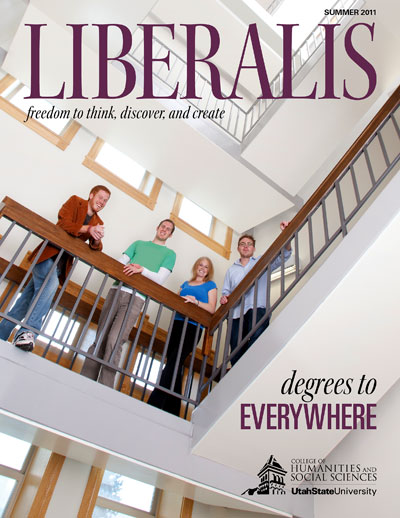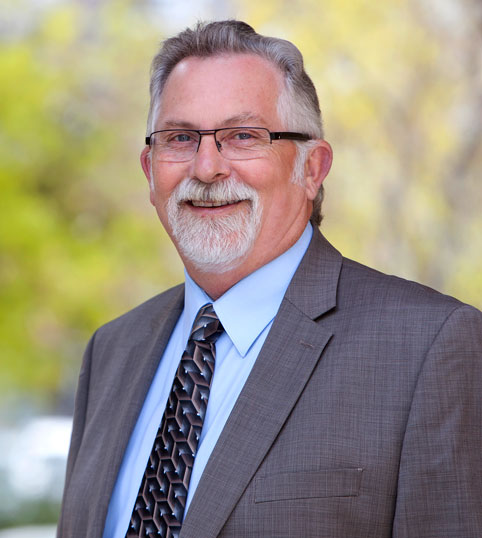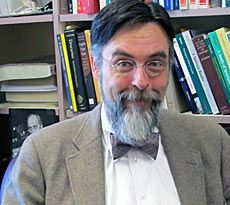‘Degrees to Everywhere’—new magazine explains liberal education
August 31st, 2011 Posted in Arts and LifeLOGAN—Amid recent criticisms that a broad liberal arts education is a waste of time, money and resources, leaders of USU’s core liberal arts college decided to stand up to critics and speak out about the competitive and life advantages its degrees offer students.
One year after the former College of Humanities, Arts & Social Sciences spun off a separate Caine College of the Arts, USU’s College of Humanities and Social Sciences (CHaSS) has given birth to new academic innovation based on the centuries-old concept of a free flow of ideas. These ideas are documented in the college’s new semiannual alumni magazine Liberalis—Latin for “of or pertaining to freedom.”
 “There’s a lot of great stories here” in the college, said CHaSS public relations specialist Kristen Munson. “There’s a lot of great work that is done here.”
“There’s a lot of great stories here” in the college, said CHaSS public relations specialist Kristen Munson. “There’s a lot of great work that is done here.”
Telling those stories is one way to counter criticism about the utility of degrees in English, history, languages and philosophy—all of which reside in CHaSS.
“One way we wanted to reach out, especially to alumni, was to start a magazine that could show them all the research and the teaching and the service that our faculty and students do here,” Munson said.
During the 2011 Utah legislative session, Sen. Howard Stephenson, R-Draper, denounced the validity of liberal arts degrees at Utah’s public universities. These are “degrees to nowhere,” Stephenson told The Salt Lake Tribune. “[T]oo few students are graduating in scientific and technical fields and … jobs are going unfilled as a result.”
• Related Story: Faculty, students take aim at lawmaker’s ‘degrees to nowhere’ remark
Munson, who wrote most of the new magazine’s content, said the purpose of the publication is to highlight accomplishments to insure that the exceptional faculty and alumni who are a part of CHaSS are not forgotten. The goal is to illustrate just how valuable these degrees really are.
‘Degrees to Everywhere’
CHaSS Dean John Allen and several other faculty members have said they want to make it clear that the majors that come out of CHaSS don’t only equip students with an A-plus education, but they also give them the freedom and ability to find success anywhere and everywhere.
 “In today’s world, problems will not be solved by any one discipline,” Allen writes on the college’s website. “Issues such as disease, poverty and terrorism do not respect borders or state lines. The College of Humanities and Social Sciences prepares students to address the complex challenges that lie ahead by thinking critically, thinking creatively, and thinking big.
“In today’s world, problems will not be solved by any one discipline,” Allen writes on the college’s website. “Issues such as disease, poverty and terrorism do not respect borders or state lines. The College of Humanities and Social Sciences prepares students to address the complex challenges that lie ahead by thinking critically, thinking creatively, and thinking big.
“We try to cultivate in ourselves and in our students the freedom to explore ideas, cultures, and new ways of problem-solving. We seek to be people who affirm the dignity and honor of all human beings.”
The lead article in Liberalis, “Degrees to Everywhere,” profiles four recently-graduated philosophy majors and develops the concept that a philosophy degree can offer a vast array of choices, implying that liberal arts majors can be, and are, successful.
USU senior Matt Fife, who is majoring in history and minoring in Latin and Greek, said he believes that his studies have primed him to be a good analyst. Planning on teaching after he graduates, Fife said he feels he would be good at a variety of careers because his education has been well rounded.
“What drew me to history was to learn the foundation of our civilization, to know where we came from and to know what has happened with civilizations in the past that have been very similar to us,” Fife said. “I basically view history as if you know history, then you know your future.”
 Associate dean Charlie Huenemann, a professor of philosophy, said students don’t just receive vocational training—they explore the capacity to contribute and give back to their communities. Disciplines such as philosophy, history, anthropology and sociology give students a broadened understanding of humanity and culture and how these things tie together in the world outside of academia, he says.
Associate dean Charlie Huenemann, a professor of philosophy, said students don’t just receive vocational training—they explore the capacity to contribute and give back to their communities. Disciplines such as philosophy, history, anthropology and sociology give students a broadened understanding of humanity and culture and how these things tie together in the world outside of academia, he says.
“I love that about philosophy, it seems more like the real world,” says student Leigha Foster on the college’s website.
“It’s extremely important,” Huenemann said. “It’s not just that studying the liberal arts gives you something to say at dinner parties. Studying the liberal arts makes you a fully-engaged citizen, or at least it prepares you for that.”
Further, points out the dean, more than 60 percent of the general education classes that all USU students are required to take come from the College of HSS. This means, Allen says, that not just liberal arts majors but all students will be exposed to these culturally-defining curricula by the time they graduate.
The dean has created an alumni advancement board of prominent Utah business and political leaders to help raise money and offer ideas for how the college defines itself to show that liberal arts degrees are just as viable as ever. Every board member suggested that students learn the classics, Allen said, and if they do that they will go far.
CHaSS: USU’s Liberal Arts College
Faculty and staff from across the new college were engaged in trying to identify core values and an identity for CHaSS. During the process of developing the college’s “brand,” Huenemann sent an email to Munson that encapsulated what the faculty and their disciplines are all about:
“We are interested in all kinds of freedoms—political and social freedom, but also freedom of thought, freedom from prejudices, and freedom from fixed forms of thinking,” Huenemann wrote. “We’re trying to cultivate in ourselves and in our students the freedom to explore ideas and to criticize them.
“Also,” he continued, “we try to be people who affirm the dignity and honor of human beings, from all places, cultures and times. And we know that it is our responsibility to be generous in what we can contribute, whether that’s service, or advice, or guidance.”
Associate dean Patricia Lambert, an anthropologist who oversees research and graduate education in the college, says optimism is high among faculty and students. The college is at a high point, she said. A sign of this is the fact that higher caliber teacher-scholars are applying for jobs here, adding to the already high quality of the existing faculty.
Allen agrees. He said the college is a premiere liberal arts college at the center of a land grant university, with dedicated teacher-scholars as faculty. The college houses 18 undergraduate degrees and nine graduate programs in six academic departments and related programs.
“This is a land-grant institution whose mission is to educate and broaden the horizons of the sons and daughters of Utah,” said Ted Pease, head of the journalism and communication department, who chaired the college’s branding committee. “We give students the tools to go anywhere—or everywhere—and give them the tools to think and navigate the world themselves. That’s the whole point of this new college.”
History department chair Norm Jones, who directs general education for the university, said when a student graduates with a professional degree such as business or accounting, they get a job in business or accounting. With a liberal arts degree, students are well-versed in the broad concepts that constitute the entire world around them—human-to-human contact.
“It’s about this ability to participate in the world,” Jones said. “It’s the same with the sciences. If you haven’t got enough basic science to understand what the conversation is inside of your organization, then you’re sunk.”
Liberalis. What does this mean?
Nationwide, the liberal arts are under attack, Allen says. He has gone to national meetings where deans and provosts have told him to keep his head down and his mouth shut. That’s the only way that the liberal arts might survive.
But that’s not Allen’s way. “I come off a cattle ranch out of eastern Oregon,” said Allen, who says he doesn’t know how to keep his head down and his mouth shut. “I looked at what our faculty do and what our students accomplish while they’re here and when they leave, and I was proud. I know how to articulate the value that comes from this type of education.”
And the name of the college’s new alumni magazine has nothing to do with politics, Allen says. He credits Huenemann with coming up with the name by articulating the college’s core value, which faculty across the college share, that the College of HSS is about the ability and freedom to think.
Munson says Liberalis is a word that connects the many values of a college as diverse as CHaSS, which houses 10 departments, including English, history, political science, languages, philosophy and speech communication, religious studies, sociology, social work and anthropology, journalism, as well as Army and Air Force ROTC and the Intensive English Language Institute. She reiterated that the magazine is not a political vehicle, but simply a way to highlight all of the accomplishments of those affiliated with USU’s liberal arts college.
Some wondered when they first saw the magazine about negative response to the term “liberal” attached to the college, worrying that conservative lawmakers might get the wrong idea. But many others disagree.
“I think that concern shortchanges our lawmakers,” said Pease. “Any attention Liberalis gets becomes an opportunity to engage people in discussing the role and expectations of a university education—it’s a teachable moment.
“A ‘liberal’ education isn’t about politics,” he said. “It’s about an understanding of the world that is broad and wide and deep.”
Allen agrees. “Liberalis is a human endeavor,” the dean said. “It’s very much a part of the future, it’s valuable and it’s not political in any way, and I don’t see it that way.
“I do think that the future for our students and for our society—the type of future we will have—will be dependent on the quality of education we provide.”
TP
Tags: CHSS, College of Humanities & Social Sciences, John Allen, liberal arts, Liberalis

Sorry, comments for this entry are closed at this time.